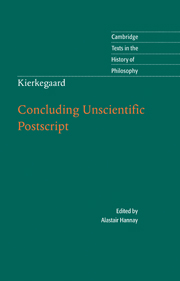Book contents
- Frontmatter
- Contents
- Introduction
- Chronology
- Further reading
- Note on the translation
- CONCLUDING UNSCIENTIFIC POSTSCRIPT TO THE PHILOSOPHICAL CRUMBS
- Preface
- Contents
- Introduction
- Part One The objective problem of Christianity's truth
- Part Two The subjective problem. The subject's relation to the truth of Christianity, or what it is to become a Christian
- 5 Conclusion
- Appendix: Understanding with the reader
- A first and last declaration by S. Kierkegaard
- Index
- Cambridge Texts in the History of Philosophy
Introduction
Published online by Cambridge University Press: 26 February 2010
- Frontmatter
- Contents
- Introduction
- Chronology
- Further reading
- Note on the translation
- CONCLUDING UNSCIENTIFIC POSTSCRIPT TO THE PHILOSOPHICAL CRUMBS
- Preface
- Contents
- Introduction
- Part One The objective problem of Christianity's truth
- Part Two The subjective problem. The subject's relation to the truth of Christianity, or what it is to become a Christian
- 5 Conclusion
- Appendix: Understanding with the reader
- A first and last declaration by S. Kierkegaard
- Index
- Cambridge Texts in the History of Philosophy
Summary
What does the Concluding Unscientific Postscript conclude?
Those with an acute ear for language will pause at the title Concluding Unscientific Postscript. Don't postscripts conclude anyway? Besides, strictly speaking, a postscript is not really a conclusion at all, but an addition, perhaps an afterthought, or a supplement, even an appended note commenting on what the reader has read previously.
Some clarification is needed to assure the reader that here as elsewhere Kierkegaard has chosen his language with care. Perhaps this ‘postscript’ was meant to be concluding in more ways than one, or even just in one way but not the one that first comes to mind. Also, and as one might guess from the work's very length, it is no mere afterthought, not just something the author forgot to include in the slim book to which this forms a gigantic sequel.
In his introduction to the Postscript Johannes Climacus, the pseudonymous author (of both books, naturally), describes it as the continuation of a project begun in that earlier work but left incomplete. The earlier work's Danish title is Philosophiske Smuler, which is traditionally translated ‘Philosophical Fragments’ but is rendered here more accurately as ‘Philosophical Crumbs’. In the conclusion of that book Johannes Climacus had made mention of what a continuation might contain, though (in a style of studied nonchalance to be found in both books) not committing himself to producing any such thing (‘if I ever write such a section’).
- Type
- Chapter
- Information
- Kierkegaard: Concluding Unscientific Postscript , pp. vii - xxxPublisher: Cambridge University PressPrint publication year: 2009

